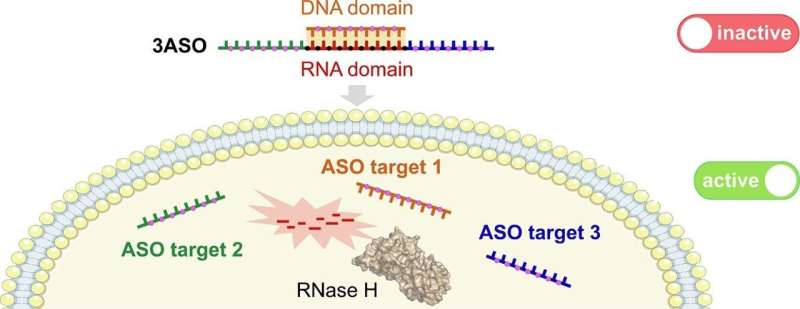Researchers from the University of Barcelona have developed a groundbreaking pharmacological tool that can simultaneously deliver three oligonucleotide-based drugs, each targeting a different therapeutic pathway within cancer cells. This innovative approach holds immense potential for treating multifactorial diseases like cancer and diabetes, where multiple signaling pathways contribute to the disease progression.

Overcoming Resistance with a Triple-Pronged Assault
Complex diseases, such as cancer, often involve the interplay of multiple factors that activate different signaling pathways within the cells. This complexity can lead to treatment resistance, as blocking the primary pathway may trigger the activation of secondary pathways.
To address this challenge, the research team from the University of Barcelona has developed a novel pharmacological tool that simultaneously delivers three antisense oligonucleotide (ASO) drugs, each targeting a specific protein associated with poor prognosis and drug resistance in breast cancer. By inhibiting the expression of Akt, Hsp27, and HER2 proteins, this triple-targeting approach has demonstrated superior toxicity against cancer cells compared to the independent administration of the three ASO drugs.
The Science Behind the Simultaneous Delivery of Three Drugs
The key innovation of this research lies in the design of the triple-drug compound. The construct is engineered to contain three separate ASO drugs, linked together by a central RNA-DNA hybrid region. This hybrid region is recognized and cleaved by the naturally occurring RNase H enzyme within the cell’s cytoplasm, effectively releasing all three ASO drugs simultaneously.
This innovative mechanism ensures that the three drugs can perform their inhibitory functions on the targeted proteins without the need for separate administration. Importantly, the specificity of the chosen targets allows the therapy to selectively target cancer cells with the relevant molecular alterations, without affecting healthy, non-tumor cells.
Unlocking the Potential for Treating Complex Diseases
The proof-of-concept study conducted by the researchers has focused on a specific type of breast cancer, but the potential of this triple-targeting approach extends far beyond. The researchers envision that this pharmacological tool could be adapted to deliver various combinations of ASO drugs, targeting multiple therapeutic targets relevant to a wide range of complex diseases, including not only different types of cancer but also conditions like diabetes.
By simultaneously addressing the multifaceted nature of these diseases, the researchers believe that this innovative therapy holds great promise for improving treatment outcomes and overcoming the limitations of traditional single-target approaches. As the research continues to progress, the team is eagerly exploring the broader applications of this groundbreaking technology in the fight against complex, multifactorial diseases.
